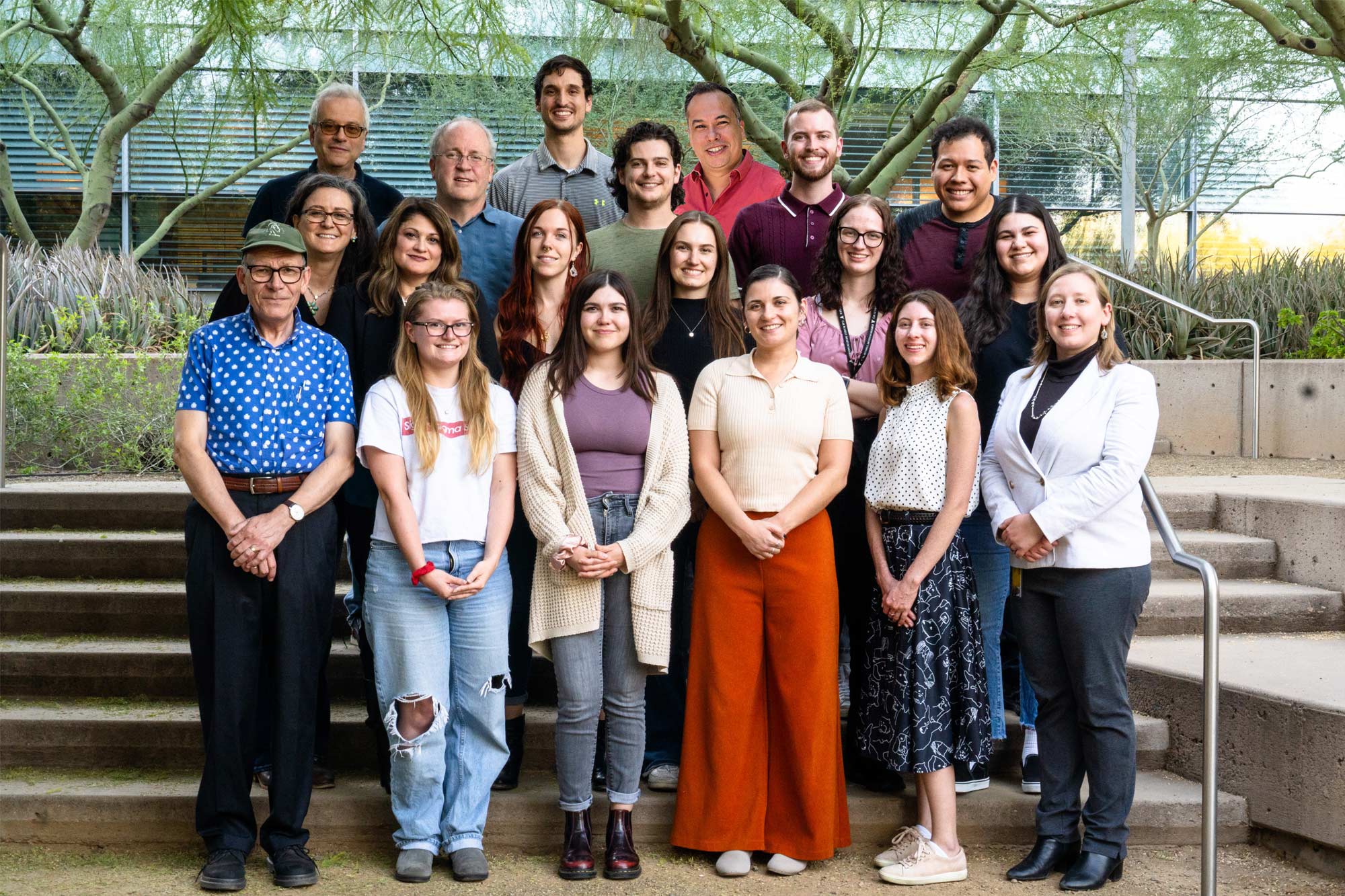Behavioral neuroscience and comparative psychology
Psychology phd specialization.
Uncover the "why" in human and animal behavior in ASU's doctoral program in psychology with a focus on behavioral neuroscience and comparative psychology.
How to apply
PhD program details

Specialization description
Degree awarded: psychology, phd.
Behavioral neuroscience and comparative psychology (BNCP) is one of six degree specializations offered through ASU's PhD program in psychology. Students are trained in interdisciplinary research on cognitive, affective and social processes, as well as underlying neurobiological mechanisms. They work closely with faculty mentors and engage in preclinical models investigating topics like:
- Addiction and drug abuse
- Aging across the lifespan in health and cognition
- Behavior of dogs and their wild relatives
- Health, cognitive and neurobiological consequences of chronic stress
- Negative emotional states
- Hormonal influences on behavior
- Menopause variants' impact on neurobiology and cognition
- Neural circuits and mechanisms that predict complex behaviors
- Sex differences in behavior
The Department of Psychology fosters a collaborative learning environment. Students specializing in BNCP complete core curriculum unique to this area of study while interacting with faculty and students across all areas of psychology.
Important dates
- September 1: Fall 2025 application opens.
- December 1: Fall 2025 application deadline.
Students must submit ASU’s graduate application and the Department of Psychology’s Slideroom application to be considered for admission.
More about applying
Faculty and research labs
Experience world-class academics taught by renowned professors who are leaders in the field of behavioral neuroscience and comparative psychology.

Dr. Heather Bimonte-Nelson
Neuroscience of memory and aging lab .
The Neuroscience of Memory and Aging Lab characterizes hormone- and age- related cognitive, behavioral, and brain changes. Research addresses the impacts of transitional and surgical menopause variations, endogenous and exogenous sex hormone exposures across the lifetime, and how these factors intersect to impact lifetime trajectories in females.
Explore the lab
View faculty profile

Dr. Cheryl Conrad
Behavioral neuroscience research in stress lab.
How does stress influence brain plasticity and resilience? The Behavioral Neuroscience Research in Stress Lab use a chronic stress model to reveal physiological and behavioral symptoms akin to depression. Their breakthroughs are instrumental in promoting overall well-being and survival.
Recruiting new students for fall 2025

Dr. Jonathan Gewirtz
Laboratory in affective neuroscience and epigenetics.
The Laboratory in Affective Neuroscience and Epigenetics uses rodent behavioral models, molecular and pharmacological tools, and multi-omic epigenomic sequencing to study mechanisms underlying vulnerability to drug addiction and other forms of mental illness, and their persistence over time.

Dr. Foster Olive
Addiction neuroscience lab.
Exploring the enduring impact of drug abuse on the brain, the Addiction Neuroscience Lab employs preclinical methods to identify, mitigate, or reverse related alterations. They investigate the roles of neurochemical and neuroinflammatory processes in understanding dependence, addiction, and associated changes.

Dr. Federico Sanabria
Basic behavioral processes lab.
Investigates the fundamental building blocks of behavior and cognition common to many species, including learning, interval timing, choice, and regulation. They develop quantitative models of these processes through novel behavioral paradigms implemented in animal models.

Dr. Jessica Verpeut
The social neurobiology lab: study of circuits in adolescent life.
Exploring neural activity, molecular mechanisms, and complex cognitive and social behavior in preclinical animal models, the SOCIAL Neurobiology Lab aims to identify novel therapeutic targets. Their research focuses on sensitive development periods, gene-environment interactions, and neuromodulators in cerebellar pathways.

Dr. Clive Wynne
Canine science collaboratory.
The Canine Science Collaboratory helps people and dogs live their best lives together. Current research focuses on identifying best practices in dog training, understanding human interpretation of dogs' emotional expressions, and investigating the impact of temporary fostering in animal shelters.
Courses and electives
Core and skill courses (24 credits).
Core courses. Students choose three 500-level courses in behavioral neuroscience and comparative psychology, along with various topical seminars available during their program. These courses align with the interests of current faculty and students.
Skill courses. Two required courses that integrate quantitative methodologies into students' work.
Electives (6 credits)
Elective breadth courses. At least one course selected from another area of study that will provide students with a broader perspective. These courses are discussed and deemed appropriate with a faculty mentor, and can include topics like:
- Cognitive psychology
- Sensation and perception
- Biochemistry
- Clinical neuroscience
- Mathematical psychology
- Cell biology
- ... and more!
Research (42 credits)
Research activities. Milestone courses, involving independent study and regular meetings with a faculty member to discuss assignments and conduct research.
Dissertation (12 credits)
Dissertation. Supervised research including literature review, research, data collection and analysis, and writing.
Graduate students in behavioral neuroscience and comparative psychology must complete 84 credit hours. Coursework is customized based on each student’s background, goals and mentor and committee input. This research-focused program includes weekly seminars and offers the option to earn a master’s degree en route to a PhD. Students actively participate in professional research activities such as conference presentations, publishing papers and grant preparation.
Student Handbook

The behavioral neuroscience and comparative psychology specialization is committed to training the future trailblazers of scientific discovery and academic leadership.
Faculty members serve not only as educators but also as mentors, guiding students towards impactful research and fulfilling careers, including tenured positions at universities and leadership roles within related industries and non-profit organizations.
Get in touch
- For questions about the specialization, email the BNCP area head, Dr. Federico Sanabria, directly at [email protected] .
Other specialized areas of study
Clinical psychology, cognitive science, developmental psychology, social psychology, quantitative research methods.
Boston University Academics
Boston University
- Campus Life
- Schools & Colleges
- Degree Programs
- Search Academics
PhD in Behavioral Neuroscience
For contact information, please visit the Graduate Medical Sciences website .
The mission of the Behavioral Neuroscience PhD Program is to provide students with a firm foundation in basic principles and methods of Experimental Neuropsychology in preparation for embarking on a career as an experimental neuropsychologist and behavioral neuroscientist in academia or industry.
The Behavioral Neuroscience PhD Program is unique in that the focus is on human neurobehavioral disorders in relation to brain structure and function. The Behavioral Neuroscience Program provides a true translational link between cutting-edge research and its emphasis on medical patient care. Our students and alumnae represent strong, talented, and highly productive professionals. The strength and uniqueness of the Behavioral Neuroscience Program is exemplified in the quality and constitution of our course offerings, faculty, and research opportunities.
The Behavioral Neuroscience PhD Program is an interdisciplinary program administered through Graduate Medical Sciences , Chobanian & Avedisian School of Medicine, and consists of faculty members mainly in the Departments of Neurology , Psychiatry , and Anatomy & Neurobiology . Many hold joint research and/or clinical appointments with the VA Boston Healthcare System.
The key features of the program are:
- The delineation and analysis of perceptual, cognitive, linguistic, affective, and behavioral disorders observed in neurologic disease, as these disorders contribute to an understanding of normal brain function and its modification by pathology .
- The subject matter derives primarily from clinical populations with neurological disorders affecting higher processes, particularly from the study of syndromes involving selective impairment of functional systems such as memory, language, attention, executive functioning, and/ or purposeful movement.
- Current methods of clinical assessment, neuropsychology, experimental design, and the neurosciences are integrated into a broad program focused on clinical research. There is also limited opportunity for basic science research.
Students in the program are required to participate in a research apprenticeship with a faculty member with course units being offered as Research in Behavioral Neuroscience. This arrangement is intended as preparation for independent research careers. Students also have the opportunity to participate in grand rounds, and to attend didactic seminars and hospital lectures at Boston University Chobanian & Avedisian School of Medicine and the VA Boston Healthcare System.
The doctoral program curriculum consists of core and elective courses and research in neuropsychology within Graduate Medical Sciences. Candidates may also enroll in directed studies or graduate courses offered in other Chobanian & Avedisian School of Medicine departments, including but not limited to, the Departments of Anatomy and Neurobiology , Psychology , and course offerings of the Graduate Program for Neuroscience . For some students with specialized interests and backgrounds, additional courses available throughout Boston University may be credited toward the PhD degree with special permission.

Learning Outcomes
The goals of the Behavioral Neuroscience PhD program are to provide students with a firm foundation in basic principles and methods of Experimental Neuropsychology to prepare students for embarking on a career as an experimental neuropsychologist and behavioral neuroscientist in academia or industry.
At the conclusion of the program, students will be able to:
- Demonstrate an in-depth understanding of the relationship between neuroanatomy and neurobehavior and cognition.
- Demonstrate an in-depth understanding of the relationship between neuropathology and neurobehavior and cognition.
- Demonstrate proficiency in assessing behavioral and cognitive skills and deficiencies based on neuropathology and/or neurodegenerative disorders.
- Design and perform assessments and data acquisition, and data analyses for scientifically sound research studies.
- Read, interpret, and present scientific findings.
Program Requirements
The Behavioral Neuroscience PhD program is a full-time program only. Most students complete the program in 5–7 years. Matriculation is in September only.
A total of 64 units is required to fulfill the program requirements. This includes the core courses as well as elective courses and units for performing research activities in one of the program’s research labs. If a student enters the program with a related master’s degree, they may be required to complete 32 units rather than 64 units.
Course Descriptions
The curriculum for the doctoral program consists mainly of existing courses within Graduate Medical Sciences.
Core Courses
Required of all PhD students in the p rogram (MD/PhD students are exempt from taking Basic Neurosciences). A brief description of each course being offered appears below. A graduate-level course in statistics is also required.
- Human Neuropsychology Seminar I (GMS BN 775)
- Human Neuropsychology Seminar II (GMS BN 776)
- Basic Neurosciences Survey (GMS BN 778)
- Neuropsychological Assessment I (GMS BN 796)
- Functional Neuroanatomy in Neuropsychology (GMS BN 798)
Elective Courses
- Research in Behavioral Neuroscience (GMS BN 991 or 992)
- Behavioral and Biological Aspects of Stress and Trauma (GMS BN 780)
- Directed Studies in Behavioral Neuroscience (GMS BN 791, 792)
- Brain Asymmetry: Functional and Structural Differences Between Hemispheres (GMS BN 794)
- Cognitive Neuroscience of Memory and Perception (GMS BN 795)
- Neuropsychological Assessment II (GMS BN 797)
- Seminar in Neuroimaging (GMS BN 821)
- Case Studies in Neuropsychology (Sections A, B, and C) (GMS BN 891, 892)
- Child Clinical Neuropsychology (GMS BN 893)
- Beginning Basic Neurosciences (GMS BN 779)
GMS BN 775 & 776, Human Neuropsychology I and II, 4 units each
Course focuses on the relationship of the field of neuropsychology to other medical and scientific disciplines. Includes the study of attention, cerebral dominance, pathologies of language, traumatic brain injuries, PTSD, and Parkinson’s.
Course focuses on the relationship of the field of neuropsychology to other medical and scientific disciplines. Includes neuropsychological aspects of neurological disease of dementing diseases, memory, epilepsy, child development, neurotoxicant exposures, and brain stimulation treatments.
GMS BN 778, Basic Neurosciences, 4 units across two terms (also offered as GMS BN 779 for 2 units each term)
Gms bn 778 & 779.
Overview includes neurophysiology, neurochemistry, neuroanatomy, neurobehavior, and neuropsychopharmacology. Processes occurring at the cellular and physiological levels are related to known central nervous system dysfunction.
GMS BN 780, Behavioral and Biological Aspects of Stress and Trauma, 2 units
This course reviews the psychobiological aspects of responses to trauma and stressful conditions, including the importance of individual differences and social factors.
GMS BN 791, 792, Directed Studies in Behavioral Neuroscience, variable units
In a one-on-one format, students work closely with a faculty member to study a topic of special interest to both of them.
GMS BN 794, Brain Asymmetries: Functional and Structural Differences Between Hemispheres, 4 units
The distinctive roles of the left and right hemispheres are reviewed, first by examining alterations in language and nonverbal behavior under conditions of brain damage and second by examining techniques used to investigate functional asymmetry in the normally intact brain.
GMS BN 795, Cognitive Neuroscience of Memory and Perception, 4 units
The study of normal and abnormal memory and perception is related to brain structure and function, theoretical and clinical issues about how abilities change with increasing age.
GMS BN 796, Neuropsychological Assessment I, 4 units
Overview of neuropsychological tests used for cognitive assessment in clinical and research settings. Focus is on determining appropriate outcome measures to quantify brain behavior relationships. This course prepares students to design neuropsychological assessment batteries for research studies.
GMS BN 798, Functional Neuroanatomy in Neuropsychology, 4 units
This course has been designed to provide students with a foundational and comprehensive review of the structures and functions of the human nervous system, as well as an introduction to neuropathology and the sequelae associated with congenital and acquired disorders of the central nervous system.
GMS BN 821, Neuroimaging Seminar, 2 units
This course is intended for students with limited background in the application of neuroimaging techniques for the study of psychiatric and neurological illnesses. Techniques, including MRI, fMRI, DTI, MRS, PET, and SPECT, will be discussed with relevance to selected neurobehavioral disorders.
GMS BN 891 & 892, Case Studies (three different clinical rounds, Sections A1, B1, and C1), 2 units per Section
Individual patients with perceptual/cognitive/affective symptomatology concomitant with brain damage are examined intensively through the use of a variety of behavioral assessment procedures. Patients’ symptoms and test results are reviewed for the differential diagnosis and etiology of neurological syndromes. Emphasis on qualitative and quantitative analyses of standardized and experimental tests. There are three distinct sections of this course each term. These sections specialize in different neurobehavioral disorders.
GMS BN 893, Child Clinical Neuropsychology, 4 units
Covers general theoretical issues (e.g., intrauterine and postnatal development of the brain, handedness and lateralization of function, and recovery of function and neurobehavioral plasticity); diagnostic entities (e.g., attention deficit disorder, early brain damage, developmental language disorders, dyslexia, and effects of malnutrition); and assessment and treatment.
GMS BN 991 & 992, Research in Behavioral Neuroscience, variable units
Related bulletin pages.
- Graduate Medical Sciences Courses
- Abbreviations and Symbols
Beyond the Bulletin
- GMS Admissions
- Financial Assistance
- The Vesalius Certificate
- Anatomy & Neurobiology
- Behavioral Neuroscience
- Biochemistry
- MD/PhD in Bioinformatics
- Biomedical Forensic Sciences
- Biomedical Research Technologies
- Biomedical Sciences (PiBS)
- Clinical Research
- Forensic Anthropology
- Genetic Counseling
- Genetics & Genomics
- Health Care Emergency Management
- Health Professions Education
- Medical Anthropology & Cross-Cultural Practice
- Medical Sciences
- Mental Health Counseling & Behavioral Medicine Program
- Microbiology
- Molecular & Translational Medicine
- Neuroscience
- Nutrition & Metabolism
- Oral Biology
- Oral Health Sciences
- Pathology & Laboratory Medicine
- Pharmacology & Experimental Therapeutics
- Physician Assistant
- Physiology or Biophysics
- Departments
- BU Medical Campus Library
- Graduate Medical Sciences Student Organization (GMSSO)
Terms of Use
Note that this information may change at any time. Read the full terms of use .
related websites
- Graduate Medical Sciences
- Laboratory of Neuropsychology Graduate Program
Accreditation
Boston University is accredited by the New England Commission of Higher Education (NECHE).

- © Copyright
- Mobile Version

IMAGES
VIDEO